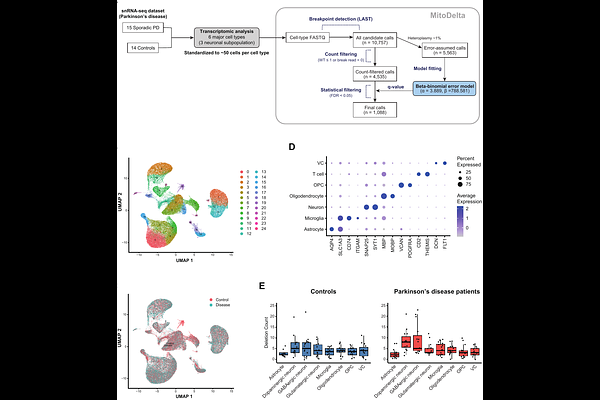MitoDelta: identifying mitochondrial DNA deletions at cell-type resolution from single-cell RNA sequencing data

MitoDelta: identifying mitochondrial DNA deletions at cell-type resolution from single-cell RNA sequencing data
Nakagawa, H.; Shima, Y.; Sasagawa, Y.; Nikaido, I.
AbstractBackground Deletion variants in mitochondrial DNA (mtDNA) are associated with various diseases, such as mitochondrial disorders and neurodegenerative diseases. Traditionally, mtDNA deletions have been studied using bulk DNA sequencing, but bulk methods average signals across cells, thereby masking the cell-type-specific mutational landscapes. Resolving mtDNA deletions at single-cell resolution is beneficial for understanding how these mutations affect distinct cell populations. To date, no specialized method exists for detecting cell-type-specific mtDNA deletions from single-cell RNA sequencing data. Notably, mtDNA possesses unique molecular features: a high copy number, stable transcription, and compact structure of the mitochondrial genome. This results in a relatively high abundance of mtDNA-derived reads even in single-cell RNA sequencing data, suggesting the possibility of detecting mtDNA deletion variants directly from transcriptomic data. Results Here, we present MitoDelta, a computational pipeline that enables the detection of mtDNA deletions at cell-type resolution solely from single-cell RNA sequencing data. MitoDelta combines a sensitive alignment strategy with robust statistical filtering based on a beta-binomial model, allowing accurate identification of deletion events even from noisy single-cell transcriptomes. To capture cell-type-specific deletion patterns, MitoDelta analyzes reads pooled by annotated cell types, enabling quantification of deletion burden across distinct cellular populations. We benchmarked MitoDelta against existing mtDNA deletion detection tools and demonstrated superior overall performance. As a practical application, we applied MitoDelta to a published single-nucleus RNA sequencing dataset for Parkinson\'s disease and revealed distinct mtDNA deletion burdens across neuronal subtypes. Conclusions MitoDelta enables the transcriptome-integrated, cell-type-specific detection of mtDNA deletions from single-cell RNA sequencing data alone, offering a valuable framework for reanalyzing public datasets and studying mitochondrial genome alterations at cell-type resolution. This integrated approach enables insights into how mtDNA deletions are distributed across specific cell types and cellular states, providing new opportunities to investigate the role of mtDNA deletions in cell-type-specific disease mechanisms. The tool is available at https://github.com/NikaidoLaboratory/mitodelta.